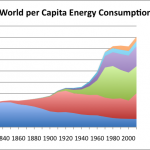Energy Policy
Climate change is a settled issue. It is now widely and recognized as real, and as one of the top, if not THE top, existential problems the world faces today. Americans want climate change stopped, and they want the next version of the US Government, the one that starts in January, 2017, to work hard to reduce the human release of greenhouse gas as rapidly as possible.
How do we know this?
Because no one mentioned a thing about it during last night's debate!
A few months ago, I would have expected presidential debates to have included climate change pretty much in every iteration. It…
Top “Ten” Recent Books (focusing on 2012 but including the last few years) on Climate, Science denialism, Energy, and Science Policy are (including one Post Warming novel) are:
Before the Lights Go Out: Conquering the Energy Crisis Before It Conquers Us by Maggie Koerth-Baker
Climate Change Denial: Heads in the Sand by Haydn Washington and John Cook
Deep Water: As Polar Ice Melts, Scientists Debate How High Our Oceans Will Rise (Kindle Single) by Daniel Grossman, TEDx Books (Kindle Single)
Fool Me Twice: Fighting the Assault on Science in America by Shawn Lawrence Otto
Rising Sea Levels: An…
The always-thoughtful Gail Tverberg has a great post that simply shows in visual terms the history of world energy consumption - well worth a look. I've reproduced one of her graphs here, but please read the whole thing.
One graph not in her post (not suggesting it should be, but I like the contrast) is world discovery of oil over about the same period - anyone who implicitly believes we are discovering vast reserves should contrast the two:
(Source, Colin Campbell)
Gail goes on to write about how an economist might be misled by past trends to disregard "facts in the ground" - lack of…
One of the impediments to the adoption of a solar alternative to fossil fuels is that solar panels are relatively expensive to make. A big benchmark to making them competitive is to get their cost of production per Watt produced comparable to energy produced by fossil fuels.
A company in Arizona, First Solar, claims to have broken the $1/Watt barrier for producing solar panels using panels made from cadmium telluride (CdTe). I am definitely impressed, particularly because the company aims to read "grid parity" with fossil fuels, meaning that they will be cost-competitive even without…
An article by Evan Mills, a staff scientist at Lawrence Berkeley National Laboratory, points out that scientific buildings use a lot more energy than average:
Improving energy productivity is a doubly worthy challenge, given that those making the biggest contributions to the science of sustainability often do so in highly energy intensive facilities such as laboratories, computing centers, and hyper-clean environments. There is a long way to go to meet the sustainable practices. According to a U.K. Department for Environment, Food, and Rural Affairs survey, virtually all interviewed…
Two great articles on energy policy.
1) One of the major points of resistance to carbon taxes or caps is that developing countries won't have similar quotas giving them a comparative advantage in the production of goods. However, some economists don't think that comparative advantage will be very large. The percentage of the cost of production that goes to energy is small for most goods, and only certain industries will be affected. From the Economist:
The authors of "Leveling the Carbon Playing Field", published recently by the Peterson Institute for International Economics, a think-tank…
Sales of Vespas are up -- largely because of high oil prices. Vespas and other motorcycles have significantly greater fuel economy than your average car.
Part of me is happy about this because it illustrates that people are making more fuel-efficient choices. When prices go up, people use less gas. Go figure.
On the other hand, I don't think I will ever get over my aversion to riding a motorcycle -- inculcated by my ER doctor father who has had to deal with the grisly remains of motorcycle accidents. Fuel economy notwithstanding, I don't think I can get over the safety issue.
It is as…
Haha! The Law of Demand works. Price goes up. Driving goes down.
Figure: NYTimes
I repeat: if you want to lower demand for and hence consumption of gasoline, this is the best thing that has ever happened for you. Prices are the most effective climate change abatement policy, and a gas tax holiday is a horrible idea.
Hat-tip: Greg Mankiw
Bryan Caplan writing in the NYTimes suggests that in spite of making no economic sense whatsoever the gas tax holiday might be a good idea as a symbolic gesture:
The first is that the tax holiday is a relatively cheap symbolic gesture that makes truly bad policies less likely. The main causes of high gas prices are probably factors beyond our control, like rapid growth in China and India and low real interest rates. But voters don't want to hear this; they want politicians to "do something!"
During our last big energy crisis, in the 1970s, "something" turned out to be a salad of populist…
(Keeping with our trend towards a week of economics -- see here and here -- I have another post where I attempt to talk above my pay grade.)
I am as unhappy as anybody about high oil prices making everything on Earth expensive, but I am getting a little annoyed by the Presidential candidates glib statements about how the intend to make it better.
Both Clinton and McCain have come out for a gas tax holiday over the summer. This is a horrible idea for at least two reasons. (1) It will just be a wind fall for oil producers. (2) We need to lower our oil consumption, and high prices are the…
Now that's thinking outside the box:
Two graduate students at MIT's School of Architecture and Planning want to harvest the energy of human movement in urban settings, like commuters in a train station or fans at a concert.
The so-called "Crowd Farm," as envisioned by James Graham and Thaddeus Jusczyk, both M.Arch candidates, would turn the mechanical energy of people walking or jumping into a source of electricity. Their proposal took first place in the Japan-based Holcim Foundation's Sustainable Construction competition this year.
A Crowd Farm in Boston's South Station railway terminal…
C. Ford Runge and Benjamin Senauer, writing in Foriegn Affairs, summarize the likely effects of corn-based biofuels on the world food supply. Take home message: the biofuel craze has led to skyrocketing food prices which -- along with government subsidies and tariff protections to domestic corn producers -- has the potential to starve the poorest in the world.
Money quote:
Now, thanks to a combination of high oil prices and even more generous government subsidies, corn-based ethanol has become the rage. There were 110 ethanol refineries in operation in the United States at the end of 2006,…
Lots of stuff has been written lately over the relative merits of carbon taxes vs. carbon trading markets. Just to summarize the policies, a carbon tax would apply an across the board premium on all users of carbon depending upon the amount they use. A carbon trading market would sell permits for carbon emission that could be traded at the market value.
Glenn Hubbard, a former chairmen of this President's Council of Economic Advisors, advocates a trading market (sadly this is behind a subscription wall because the WSJ insists on operating in the 17th century...the article is excerpted here…
Hydrogen is great, but I feel like there are some structural and technical issues that have to be solved before...you know...the angels fly down to save us and hugs and bunnies abound. Popular Mechanics introduces a note of realism to the debate on alternative fuels with a great article on hydrogen fuel:
At first glance, hydrogen would seem an ideal substitute for these problematic fuels. Pound for pound, hydrogen contains almost three times as much energy as natural gas, and when consumed its only emission is pure, plain water. But unlike oil and gas, hydrogen is not a fuel. It is a way of…
The entry that I posted on research challenging the idea that Hummers are worse for the environment than hybrids has sparked a great deal of contreversy and criticism. I cannot say that I find this entirely surprising.
There have been several very reasonable criticisms related their failure to publish their methods and their assumption that hybrids will have a significantly shorter operating life than Hummers. (They assert that the average operating life of a Hummer is 300,000 miles while the average operating life of a Prius is 100,000 miles.) Specifically with respect to the operating…
Hybrid vehicles clearly have better gas mileage than many SUVs on the market, but does the gas mileage as a figure accurately represent the total energy usage required to build, market, use and destroy the vehicle?
Art Spinella, in a huge study by CNW Marketing Research, has endeavored to find the "Dust-to-Dust" energy cost for cars and trucks to determine whether we are gaining or losing ground by adopting hybrids. His study was described in this article by the Reason Foundation's Shikha Dalmia:
According to Art Spinella, the uber-auto analyst and President of CNW Marketing Research, hybrid…
A study in the newest PNAS seeks to quantify the efficiency and resource utilization for various types of biofuels:
The first comprehensive analysis of the full life cycles of soybean biodiesel and corn grain ethanol shows that biodiesel has much less of an impact on the environment and a much higher net energy benefit than corn ethanol, but that neither can do much to meet U.S. energy demand.
The study will be published in the July 11 Proceedings of the National Academy of Sciences.
The researchers tracked all the energy used for growing corn and soybeans and converting the crops into…
Several bloggers and columnists have been expressing skepticism as to the concept of energy independence, and I think they make some good arguments.
John Fialka in the WSJ:
The allure of energy independence is easy to see. It reinforces the belief that Americans can control their own economic destiny and appeals to a "deep-seated cultural feeling that we are Fortress America and we will not be vulnerable to unstable regimes," says David Jhirad, a former Clinton administration energy official who is vice president at World Resources Institute, an environmental-research group.
In fact, experts…

